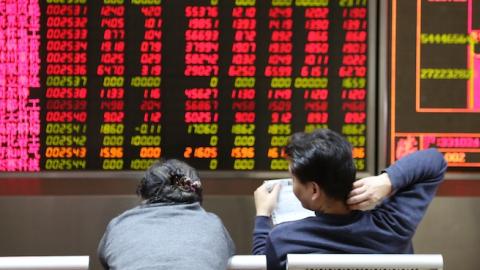China's stock market is even more corrupt than you thought, according to a fascinating story in The Fiscal Times:
Hong Zhou and Guoping Li of Beijing’s Central University of Finance and Economics find in a paper that 74 percent of private firms which get to list under Chinese IPO rules are politically connected. What’s more, those politically connected firms are also more likely to report “significant deterioration” in financial performance after listing.
“The widespread existence and ubiquitous importance of political connections in China’s stock markets suggests that to some degree, China’s stock markets have been regulated on a political connections-based regime, which may explain the poor performance of China’s stock markets,” the authors write in a paper published last week.
There's been a lot of talk about a bubble in Chinese stocks, but, as this story suggests, stock prices have largely underperformed given China’s growth. With twenty years of world beating growth rates, the Chinese stock market should have made even more millionaires than it has. One big reason for this is the role of politics in the Initial Public Offering approval process.
When a company goes public and places its shares on the open market in an IPO, insiders who invested early on can reap large rewards because their pre-IPO investments now turn into shares that can be sold at higher prices on the stock market. In China, politically connected firms appear to receive special treatment: they get approval for IPOs based on misleading and false information, and they escape penalties when any problems appear. What this means in concrete terms is that while the insiders reap huge reward, the ordinary people who buy shares in these companies will watch their shares lose value as the companies fail to live up to expectations — because those expectations were based on false, misleading and incomplete data. The company doesn’t do well and share prices go down, or in a best case scenario go up but not as much as they should have as the original, politically-connected investors cash in and laugh all the way to the bank.
This is not only bad news for individual investors; it points to a central flaw in the Chinese economic model, a flaw that is taking an increasing toll. China’s capital allocation system has been so highly politicized that hundreds of billions of dollars in precious, irreplaceable funds have gone to investments that will not pay for themselves. Sometimes it is state-owned enterprises or local governments getting access to huge amounts of credit for political rather than economic reasons; sometimes it is private sector loans that are driven by policy rather than fundamentals (China regularly tweaks the cost and availability of credit to prop up housing prices by luring more investors to buy real estate); as we see here, it can be through a system that fails to screen IPOs properly.
Chinese authorities are for the most part very good with analysis and they understand with perfect clarity that their economic growth model needs to change. Reform, however, is a lot harder than it looks. There's been a lot of talk about the need for a shift from export-oriented growth based on manufacturing cheap products for sale abroad to a service-oriented economy based on domestic consumption. But expediting that adjustment is only part of the challenge. China also needs to shift from politically-driven capital markets to a system that allocates capital efficiently and transparently.
That isn’t easy to calibrate under the best of circumstances; capital markets are dynamic, fast moving, extremely sensitive to short term factors — and often moved irrationally by herd psychology. Western history since the Dutch tulip bubble of the 1600s has been marked by the booms and busts of capital markets, and as both the U.S. housing bubble and the euro bubble in countries like Italy, Spain and Greece demonstrate, the regulation of financial markets remains more of an art than a science.
In China’s case, the simultaneous shift to a new growth model and a new financial market system will be particularly tricky. That's partly because hard as both transitions are to accomplish on their own, the problems multiply when you try to do it all at once. The single problem that vexes China's policymakers more than anything else is that the political system is both deeply embedded in and dependent on the status quo. The Communist Party is held together by the very corruption that President Xi Jinping deplores, and the current system of politically based lending has grown up to keep the public happy. Getting rid of the subsidies and closing down the money losing state owned enterprises will mean that a lot of people lose their jobs.
Meanwhile, after decades of policy-based lending, China is more of a bubble kingdom than a Middle Kingdom. We're seeing housing bubbles, manufacturing bubbles, infrastructure projects that can never pay for themselves, malls that will never bring in enough revenue to cover the cost of construction, and whole regions (like the Northeast) where rust belt industries are on life support and state-driven lending for the construction of buildings that have no real commercial or residential use are the only things keeping the economy from tanking. There are so many bubbles, and they are so vital to the prosperity and thus to the political tranquillity of the country, that the government seems to have reached a place where it is equally unsafe to stand pat or to move.
China is at a political and economic impasse. The steps required to overcome the economic impasse worsen the political crisis and so, at the moment, China, despite its competent technocrats, its ambitious and activist president, and the extraordinary wealth it has created over three decades of astounding, world-changing growth, is paralyzed in the face of unfolding events. No wonder investors around the world are so worried.


















